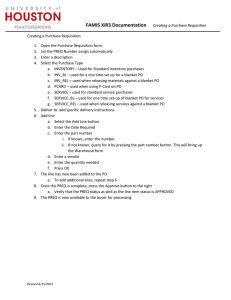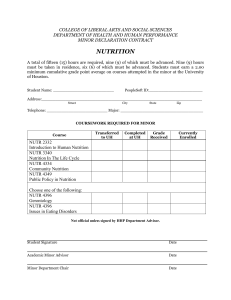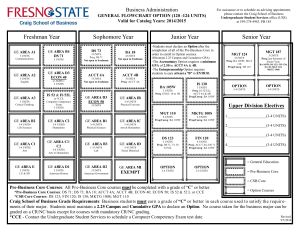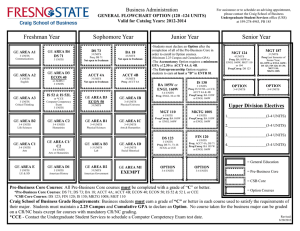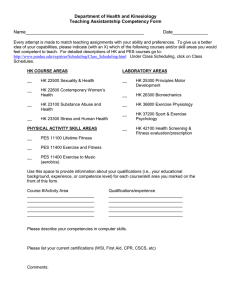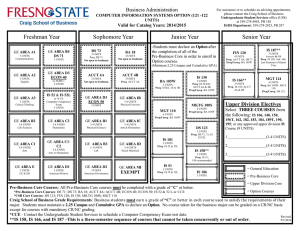PERFORMING ARTS
advertisement
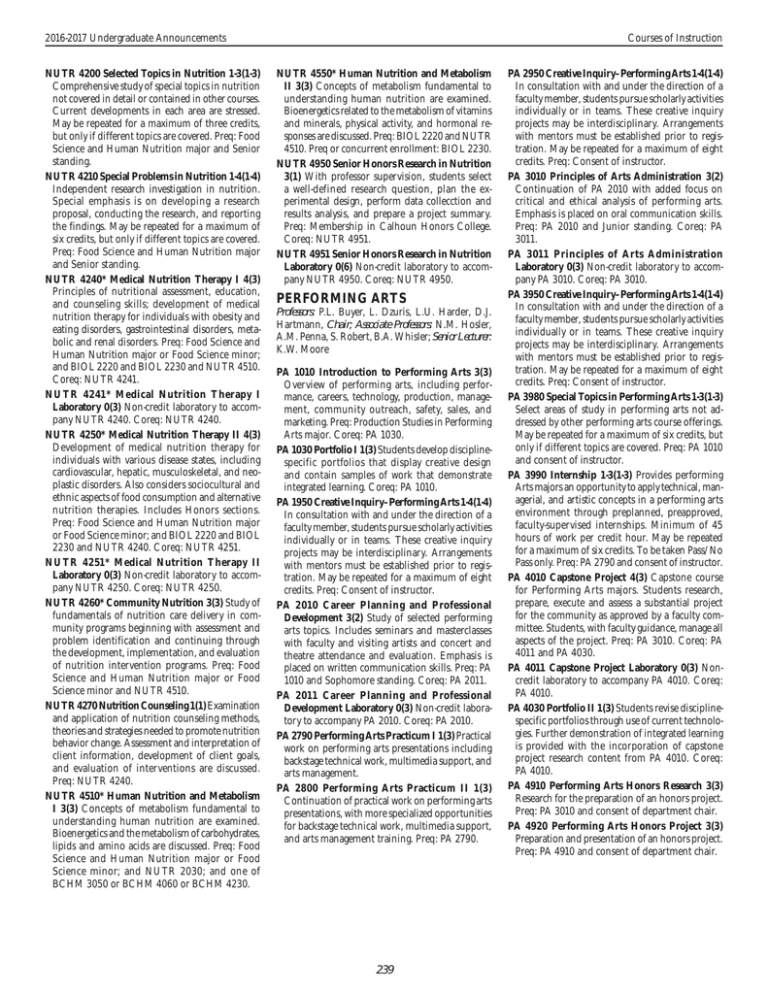
2016-2017 Undergraduate Announcements NUTR 4200 Selected Topics in Nutrition 1-3(1-3) Comprehensive study of special topics in nutrition not covered in detail or contained in other courses. Current developments in each area are stressed. May be repeated for a maximum of three credits, but only if different topics are covered. Preq: Food Science and Human Nutrition major and Senior standing. NUTR 4210 Special Problems in Nutrition 1-4(1-4) Independent research investigation in nutrition. Special emphasis is on developing a research proposal, conducting the research, and reporting the findings. May be repeated for a maximum of six credits, but only if different topics are covered. Preq: Food Science and Human Nutrition major and Senior standing. NUTR 4240* Medical Nutrition Therapy I 4(3) Principles of nutritional assessment, education, and counseling skills; development of medical nutrition therapy for individuals with obesity and eating disorders, gastrointestinal disorders, metabolic and renal disorders. Preq: Food Science and Human Nutrition major or Food Science minor; and BIOL 2220 and BIOL 2230 and NUTR 4510. Coreq: NUTR 4241. NUTR 4241* Medical Nutrition Therapy I Laboratory 0(3) Non-credit laboratory to accompany NUTR 4240. Coreq: NUTR 4240. NUTR 4250* Medical Nutrition Therapy II 4(3) Development of medical nutrition therapy for individuals with various disease states, including cardiovascular, hepatic, musculoskeletal, and neoplastic disorders. Also considers sociocultural and ethnic aspects of food consumption and alternative nutrition therapies. Includes Honors sections. Preq: Food Science and Human Nutrition major or Food Science minor; and BIOL 2220 and BIOL 2230 and NUTR 4240. Coreq: NUTR 4251. NUTR 4251* Medical Nutrition Therapy II Laboratory 0(3) Non-credit laboratory to accompany NUTR 4250. Coreq: NUTR 4250. NUTR 4260* Community Nutrition 3(3) Study of fundamentals of nutrition care delivery in community programs beginning with assessment and problem identification and continuing through the development, implementation, and evaluation of nutrition intervention programs. Preq: Food Science and Human Nutrition major or Food Science minor and NUTR 4510. NUTR 4270 Nutrition Counseling 1(1) Examination and application of nutrition counseling methods, theories and strategies needed to promote nutrition behavior change. Assessment and interpretation of client information, development of client goals, and evaluation of interventions are discussed. Preq: NUTR 4240. NUTR 4510* Human Nutrition and Metabolism I 3(3) Concepts of metabolism fundamental to understanding human nutrition are examined. Bioenergetics and the metabolism of carbohydrates, lipids and amino acids are discussed. Preq: Food Science and Human Nutrition major or Food Science minor; and NUTR 2030; and one of BCHM 3050 or BCHM 4060 or BCHM 4230. Courses of Instruction NUTR 4550* Human Nutrition and Metabolism II 3(3) Concepts of metabolism fundamental to understanding human nutrition are examined. Bioenergetics related to the metabolism of vitamins and minerals, physical activity, and hormonal responses are discussed. Preq: BIOL 2220 and NUTR 4510. Preq or concurrent enrollment: BIOL 2230. NUTR 4950 Senior Honors Research in Nutrition 3(1) With professor supervision, students select a well-defined research question, plan the experimental design, perform data collecction and results analysis, and prepare a project summary. Preq: Membership in Calhoun Honors College. Coreq: NUTR 4951. NUTR 4951 Senior Honors Research in Nutrition Laboratory 0(6) Non-credit laboratory to accompany NUTR 4950. Coreq: NUTR 4950. PERFORMING ARTS Professors: P.L. Buyer, L. Dzuris, L.U. Harder, D.J. Hartmann, Chair; Associate Professors: N.M. Hosler, A.M. Penna, S. Robert, B.A. Whisler; Senior Lecturer: K.W. Moore PA 1010 Introduction to Performing Arts 3(3) Overview of performing arts, including performance, careers, technology, production, management, community outreach, safety, sales, and marketing. Preq: Production Studies in Performing Arts major. Coreq: PA 1030. PA 1030 Portfolio I 1(3) Students develop disciplinespecific portfolios that display creative design and contain samples of work that demonstrate integrated learning. Coreq: PA 1010. PA 1950 Creative Inquiry–Performing Arts 1-4(1-4) In consultation with and under the direction of a faculty member, students pursue scholarly activities individually or in teams. These creative inquiry projects may be interdisciplinary. Arrangements with mentors must be established prior to registration. May be repeated for a maximum of eight credits. Preq: Consent of instructor. PA 2010 Career Planning and Professional Development 3(2) Study of selected performing arts topics. Includes seminars and masterclasses with faculty and visiting artists and concert and theatre attendance and evaluation. Emphasis is placed on written communication skills. Preq: PA 1010 and Sophomore standing. Coreq: PA 2011. PA 2011 Career Planning and Professional Development Laboratory 0(3) Non-credit laboratory to accompany PA 2010. Coreq: PA 2010. PA 2790 Performing Arts Practicum I 1(3) Practical work on performing arts presentations including backstage technical work, multimedia support, and arts management. PA 2800 Performing Arts Practicum II 1(3) Continuation of practical work on performing arts presentations, with more specialized opportunities for backstage technical work, multimedia support, and arts management training. Preq: PA 2790. 239 PA 2950 Creative Inquiry–Performing Arts 1-4(1-4) In consultation with and under the direction of a faculty member, students pursue scholarly activities individually or in teams. These creative inquiry projects may be interdisciplinary. Arrangements with mentors must be established prior to registration. May be repeated for a maximum of eight credits. Preq: Consent of instructor. PA 3010 Principles of Arts Administration 3(2) Continuation of PA 2010 with added focus on critical and ethical analysis of performing arts. Emphasis is placed on oral communication skills. Preq: PA 2010 and Junior standing. Coreq: PA 3011. PA 3011 Principles of Arts Administration Laboratory 0(3) Non-credit laboratory to accompany PA 3010. Coreq: PA 3010. PA 3950 Creative Inquiry–Performing Arts 1-4(1-4) In consultation with and under the direction of a faculty member, students pursue scholarly activities individually or in teams. These creative inquiry projects may be interdisciplinary. Arrangements with mentors must be established prior to registration. May be repeated for a maximum of eight credits. Preq: Consent of instructor. PA 3980 Special Topics in Performing Arts 1-3(1-3) Select areas of study in performing arts not addressed by other performing arts course offerings. May be repeated for a maximum of six credits, but only if different topics are covered. Preq: PA 1010 and consent of instructor. PA 3990 Internship 1-3(1-3) Provides performing Arts majors an opportunity to apply technical, managerial, and artistic concepts in a performing arts environment through preplanned, preapproved, faculty-supervised internships. Minimum of 45 hours of work per credit hour. May be repeated for a maximum of six credits. To be taken Pass/No Pass only. Preq: PA 2790 and consent of instructor. PA 4010 Capstone Project 4(3) Capstone course for Performing Arts majors. Students research, prepare, execute and assess a substantial project for the community as approved by a faculty committee. Students, with faculty guidance, manage all aspects of the project. Preq: PA 3010. Coreq: PA 4011 and PA 4030. PA 4011 Capstone Project Laboratory 0(3) Noncredit laboratory to accompany PA 4010. Coreq: PA 4010. PA 4030 Portfolio II 1(3) Students revise disciplinespecific portfolios through use of current technologies. Further demonstration of integrated learning is provided with the incorporation of capstone project research content from PA 4010. Coreq: PA 4010. PA 4910 Performing Arts Honors Research 3(3) Research for the preparation of an honors project. Preq: PA 3010 and consent of department chair. PA 4920 Performing Arts Honors Project 3(3) Preparation and presentation of an honors project. Preq: PA 4910 and consent of department chair. Courses of Instruction PA 4950 Creative Inquiry–Performing Arts 1-4(1-4) In consultation with and under the direction of a faculty member, students pursue scholarly activities individually or in teams. These creative inquiry projects may be interdisciplinary. Arrangements with mentors must be established prior to registration. May be repeated for a maximum of eight credits. Preq: Consent of instructor. PA 4990 Independent Studies 1-3(1-3) Supervised study for students with special interests in performing arts outside the scope of existing courses. May be repeated for a maximum of six credits. Preq: Consent of department chair. PAN AFRICAN STUDIES Associate Professor: A. A. Bartley PAS 1010 Africa and the Atlantic World 3(3) Study of Africa and its impact on the culture and life of peoples in the New World. Traces the impact Africans have had on shaping the music, language, dress, art, religion, and culture of the Western world. PAS 3010 Introduction to Pan African Studies 3(3) Study of African American experience from an Afrocentric perspective from colonial America to the present. PAS 4000 Studies in Pan African Studies 3(3) Study of selected topics or themes in Pan African Studies. Allows for individualized study of specific topics related to Pan African Studies such as music, dance, religion, colonization, slavery, or economic development. May be repeated for a maximum of six credits, but only if different topics are covered. PAS 4100 Studies in Africana Experience 3(3) Looks at the impact of Africans or African Americans on U.S. society. Interdisciplinary course that allows for the study of Africans and their descendants from a variety of perspectives. Focuses primarily on the United States. May be repeated for a maximum of six credits, but only if different topics are covered. PAS 4300 Hip-Hop and African American Contemporary Culture 3(3) Examines the controversial history and legacy of Hip-Hop culture, and explores how the artistic expression of the American underclass has evolved into worldwide cultural expression. Combines scholarship and theory with considerable audio and video exposure to various Hip-Hop songs and artists. Preq: Sophomore standing. PAS 4680 Comparative Racism and Discrimination in the Atlantic World 3(3) Seminar in the comparative history of racism and segregation in South Africa and the Americas. Preq: Sophomore standing. PAS 4710 Directed Studies on the Black Experience in Education 1-3(1-3) Students conduct research and produce scholarship on academic, social, and historical issues that impact the Black experience in educational settings. Students may also participate in service learning activities to broaden their understanding and apply their knowledge in the community. May be repeated for a maximum of nine credits. PAS 4980* Seminar on Pan African Studies 3(3) Research/writing seminar on the African American experience. Selected topics and themes from 1900 to present. Preq: PAS 3010; and one of HIST 3110 or HIST 3120 or HIST 3390. 2016-2017 Undergraduate Announcements PEARCE CENTER FOR PROFESSIONAL COMMUNICATION PCPC 4990 Pearce Center Internship 1-3(1-3) Students work in the Class of 1941 Studio for Student Communication on projects involving multimodal communications, public relations, graphic design, and publishing. Students edit copy, pitch stories, research and write articles for print, web, and/or video publication, create ePubs, develop and execute social media strategies, design marketing material, develop public relations strategies, design websites, and other related tasks. Preq: Consent of instructor. PLANT AND ENVIRONMENTAL SCIENCES Professors: H. Liu, T. Whitwell, G. Zehnder, P. Zungoli; Associate Professors: P. Agudelo, J. Andrae, K. Gasic, E. Mikhailova, D. Park, N. Tharayil; Assistant Professors: S. Narayanan, D. Thavarajah; Adjunct Faculty: J. Ellis, V. Suseela PES 1040 Introduction to Plant Sciences 3(3) Fundamental course in plant sciences, including agronomic and horticultural crops of the major agricultural areas of the world and emphasizing the crops of South Carolina. Includes Honors sections. PES 2020 Soils 4(3) Introduces world land resources, soil formation, classification, and mineralogy. Emphasizes basic chemical and physical properties of soil. Also discusses soil microorganisms, plant nutrients, and fertilization. Soil properties are related to growth. Preq: CH 1010 or CH 1020 or GEOL 1010. Coreq: PES 2021. PES 2021 Soils Laboratory 0(2) Non-credit laboratory to accompany PES 2020. Coreq: PES 2020. PES (ENGP) 3150 Environment and Agriculture 3(3) Survey of the interrelationships of the environment and current agriculture and agricultural practices to include both the environmental impacts of agriculture and the role of agriculture in conservation and improving the environment. Includes Honors sections. May also be offered as ENSP 3150. Preq: Sophomore standing and one of the following combinations: BIOL 1040 and BIOL 1060; or BIOL 1100 and BIOL 1110; or CH 1010 and CH 1020; or CH 1050 and CH 1060. PES 3350 Agricultural Biotechnology 3(2) Strategies for the best use of biotechnology and genetic resources to alleviate constraints in global hunger, environmental sustainability, and health. Includes genetic enhancement and chromosome engineering of plant, animal, and microbial systems; issues related to commercial implementation; the impact on developing countries, environmental impact, and governmental policies. Preq: GEN 3000. Coreq: PES 3351. PES 3351 Agricultural Biotechnology Laboratory 0(2) Non-credit laboratory to accompany PES 3350. Coreq: PES 3350. PES (BIOL) 3400 Medical Botany 3(3) Study of use of compounds of plant and fungal origin as poisons, hallucinogens, and pharmaceuticals. May also be offered as BIOL 3400. Preq: BIOL 1040 and BIOL1060; or BIOL 1110; and CH 1020. 240 PES 3500 Practicum 1-6(1-6) Preplanned practical or research experience related to student-selected Plant and Environmental Sciences concentration. Practicum is undertaken with an approved advisor or agency. May be repeated for a maximum of six credits. Preq: Plant and Environmental Sciences major. PES 4010 Academic and Professional Development 1(1) Students work with Career Center staff and the instructor to develop interview skills, resumes and professional goals, as well as identify skills necessary to be competitive. The importance of ethics in science careers is discussed. PES 4030* Soil Genesis and Classification 2(1) Study of soil morphology and characterization, pedogenic processes, soil-forming factors, and classification of soils. Offered fall semester only. Preq: PES 2020. Coreq: PES 4031. PES 4031* Soil Genesis and Classification Laboratory 0(3) Non-credit laboratory to accompany PES 4030. Coreq: PES 4030. PES 4050* Plant Breeding 3(3) Application of genetic principles to the development of improved crop plants. Principal topics include the genetic and cytogenetic basis of plant breeding, mode of reproduction, techniques in selfing and crossing, methods of breeding, inheritance in the major crops, and biometrical methods. Offered spring semester only. Preq: GEN 3000. Coreq: PES 4051. PES 4051* Plant Breeding Laboratory 0(2) Noncredit laboratory to accompany PES 4050. Coreq: PES 4050. PES 4060 Special Problems 1-3(1-3) Acquaints students with the scientific method. Literature investigation, planning, and execution of an experiment are integral parts of the course. Not open to students who have taken or are taking PES 4910 and PES 4920. May be repeated for a maximum of six credits. Preq: Senior standing. PES (BE) 4080* Land Treatment of Wastewater and Sludges 3(3) Principles for designing environmentally acceptable land application systems using municipal and industrial wastewater and sludges are presented. Topics include land-limiting constituent analysis; soil-plant interactions; system equipment and design; system operation and management; public acceptance, social, and regulatory issues. Case studies and field trips are planned. Preq: Senior standing. May also be offered as BE 4080. PES 4090* Biology of Invasive Plants 3(3) Introductory course covering mechanisms of plant invasions. Emphasizes unique traits that confer invasiveness and/or weediness to plants, and how these plant traits interact with the environment to facilitate invasion of agricultural lands, forests, rangelands and less-managed landscapes. Covers various cultural, chemical and biological control aspects. Preq: BIOL 1040 and BIOL 1060; or BIOL 3040. PES 4210* Principles of Field Crop Production 3(3) Principles for production of field crops. Topics include botany and physiology, tillage, harvesting, storage, and crop quality. Principles are illustrated using examples from various crops. Preq: PES 1040 and PES 2020.

